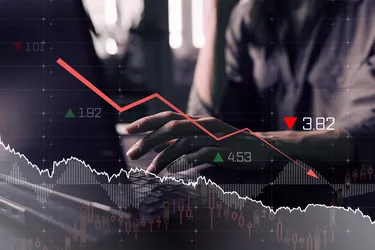
Recently, there has been a lot of talk about the possibility of the U.S. going into a recession. How will you know when a recession hits, and what effect will it have on you?
What Is a Recession?
Video of the Day
The National Bureau of Economic Research (NBER) – a private, nonprofit research organization that tracks the start and end dates of recessions in the U.S. – defines a recession as a substantial downturn in economic activity that lasts over a number of months. A recession is generally identified by economists as a decline in gross domestic product (GDP) for two consecutive quarters. However, economic indicators can also affect the identification and the duration of a recession.
Video of the Day
Other warning signs of an economic decline and a coming recession are an increase in the unemployment rate, a decline in manufacturing sales and wholesale-retail sales, a slowdown in industrial production and a decline in real personal income.
While uncomfortable, recessions are unavoidable and occur naturally with changing business cycles in the economy. Fortunately, recessions in the United States are rare.
How Long Does a Recession Last?
According to the NBER, the U.S. economy has had four recessions since 1945 that have lasted an average of 11 months.
The Gulf War Recession - The beginning of the First Gulf War in July 1990, led to a spike in oil prices and a brief recession, which lasted only eight months.
The Dot Com Recession - The tech bubble crash and 9/11 terrorist attacks caused a brief recession from March 2001 through November 2001.
The Great Recession - The crash of the real estate market was a major factor in the Great Recession, which lasted 18 months from December 2007 to June 2009.
The COVID - 19 Recession - This was the most recent recession and shortest, lasting only two months beginning February 2020, in recent history with economic growth recovering quickly due to the expansive monetary policy by the Fed.
Consider also: Where to Hole Up When the Next Recession Hits
What Causes a Recession?
There are several causes that can lead to a recession.
An overheated economy - When excessive demand exceeds supply, you get an overheated economy. This can lead to rising inflation and a decline in the unemployment rate below its natural rate. The Federal Reserve Bank can unintentionally overheat the economy by increasing the money supply with the goal of keeping interest rates low.
Asset bubbles - The "dot.com" bubble led to a financial crisis and the recession in 2001 and the housing bubble preceded the 2007-2009 recession. The rapid, irrational rise in the stock market of technology companies and jump in real estate prices ultimately led to panic selling in these markets and a recession.
External shocks to the economy - The spikes in oil prices when OPEC shut off its oil production in the '70s led to a recession that caused inflation to rise in spite of the high unemployment rate. The coronavirus pandemic is another recent example of an external shock that can shut down economies across the globe.
Consider also: What Is the Time Lag in Monetary or Fiscal Policy?
A recession is a significant decline in economic activity that can last several months.
What Is the Difference Between a Recession and a Depression?
A depression is far worse than a recession. A depression can last much longer, maybe several years, result in more job losses, a steeper increase in the unemployment rate and a more significant decline in the real GDP. Fortunately, the U.S. has only had one depression, the Great Depression, which began in 1929 and ran through 1933. But the economy didn't totally recover until nearly 10 years later and the beginning of World War II.
By comparison, the Great Recession, which is the worst recession since the Great Depression, lasted from December 2007 to June 2009, about 18 months.
Consider also: Why Layoffs Ultimately Backfire
How Does a Recession Affect the Average Person?
The most immediate effect of a recession or economic downturn is that people lose their jobs. New jobs are hard to find and even those that keep their jobs may face pay cuts and loss of benefits. This can lead to the inability to pay your bills, a decline in your credit score and difficulty in getting new loans as lenders tighten their credit standards.
If you have investments in stocks and bonds, you may see steep declines in your retirement plans.
The best way to prepare for a recession is to maintain an emergency fund that covers at least six months of your household expenses.